Topic: State Water Plan Fund
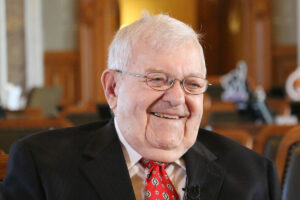
Interview of August (Gus) Bogina, February 6, 2018
Interviewed by H. Edward (Ed) Flentje
In this 2018 oral history interview, former State Senator August (Gus) Bogina discusses his service in the Kansas Legislature, focusing on his 14 years in the Senate. Bogina reflects on his relationships with Senate leaders and governors during his 11 sessions as Chair of the Senate Ways and Means Committee. Bogina also describes his storied ride with the Highway Patrol when he was brought back from Johnson County following bypass surgery to cast the deciding vote on the water plan funding.
A version of this interview is also posted on KansasMemory.org, the website of the Kansas Historical Society.
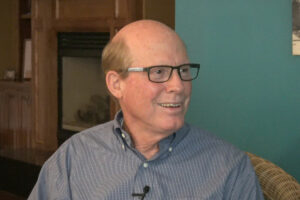
Interview of Ken Grotewiel, December 5, 2019
Interviewed by Rex Buchanan
In this 2019 oral history interview, former Representative Ken Grotewiel recalls learning about the state and its urban/rural divide in addressing water issues. He found that these issues were not generally decided on a partisan basis. While representing Wichita in the Kansas House of Representatives, Grotewiel developed a good working relationship with Carl Dean Holmes, a Republican House member from western Kansas, especially on water issues, when they served together on the House Energy and Natural Resources Committee. Although Grotewiel had a reputation as a liberal environmentalist, he views his approach as that of a pragmatist. Among the Show Morewater issues addressed during his service in the House were purchasing storage in federal reservoirs that involved “minimum desirable stream flows,” irrigation, “water rights” that can affect streams, and the interbasin transfer of water. Grotewiel describes in some detail the challenges of passing legislation to fund the State Water Plan; legislation strongly opposed by farm groups and irrigators. He sites approval of water plan funding as an example of bipartisan cooperation and as the most significant accomplishment during his time in the Legislature. By the time he was appointed by Governor Sebelius to be Assistant Director of the Kansas Water Office in 2002, he noted considerable breakdown of civility in the Legislature. Among issues Grotewiel worked on during his service in the Water Office were use of federal money to purchase water rights along the Arkansas River and the purchase of land to protect the Equus Beds aquifer along with resisting the Legislature's diversion of Water Plan moneys for other purposes. Show Less
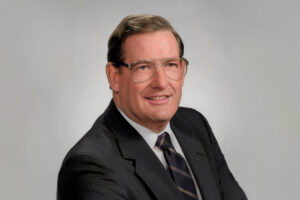
Interview of Carl Holmes, September 3, 2020
Interviewed by Rex Buchanan
In this 2020 oral history interview, former State Representative Carl Holmes discusses his observations of state water policy formulation in the 1970's through 2012. Holmes began his involvement in water policy as a farmer and active member of his community in southwest Kansas. In many respects, his experiences reflect the water-energy nexus. Holmes describes how he had observed cities and irrigators mining water in southwest Kansas. He recalls developing a comprehensive understanding of water issues by interviewing the managers of the state’s water resources. In this interview, Holmes describes how he managed the House Energy and Natural Resources Committee by Show Morecreating subcommittees and educating members on how to work bills and guide them through the process. He discusses his bipartisan work with Representative Ken Grotewiel and other committee Democrats in the 1990s, actions that resulted in the Speaker removing him from the chairmanship of the committee. Holmes describes how irrigation changed over time from flood to sprinklers and how the sprinkler systems have become more efficient. However, Holmes observed that groundwater levels continue to decline leading to abandoned wells, the growing of crops that require less water, the return to dryland farming, and, for some, the call for diversion of water from distant sources, such as the Missouri River, to sustain farming and communities on the plains. Show Less
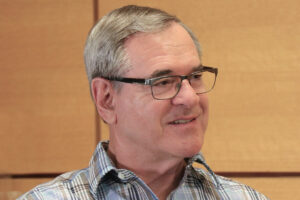
Interview of David Pope, September 19, 2019
Interviewed by Rex Buchanan
In this 2019 oral history interview, David Pope describes how the awareness of declining water levels in the High Plains Aquifers in Kansas led to efforts to support wise use and responsible management of groundwater in the state. He describes being hired to address groundwater issues from the local perspective and how he was involved in the creation the Groundwater Management District (GMD) in southwest Kansas. As Assistant Chief Engineer of the Department of Agriculture’s Division of Water Resources and later Chief Engineer, Pope was involved in a state policy limiting new groundwater development, referred to as planned Show Moredepletion, along with efforts to develop regulations on water management to replace the prior ad hoc approach. Pope discusses his dealings the U.S. Army Corps of Engineers in assuring minimal desirable streamflow to satisfy municipal and industrial water users along with conservation and recreation interests. He describes the complex interplay of surface and groundwater use policies which became a politically highly charged issue in addressing the Cheyenne Bottoms wetlands issue, Pope explains how the water law premise of "first in time, first in right" has been modified with amendments and regulations that require the filing of water rights, development of conservation plans to assure the beneficial use of water, mandatory metering of water use, and closure of areas for new water rights, all based on hydrologic studies. He concludes that although some GMDs have not tackled long-term depletion problems in western Kansas, two districts have adopted successful strategies: safe yield rules adopted by Groundwater Management District No. 2, and the creation of the Local Enhanced Management Area (LEMA) in Sheridan County to regulate irrigation. Pope describes those successes and speculates on why others have not been as successful. Show Less
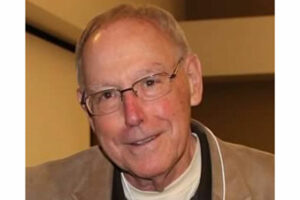
Interview of John Strickler, May 22, 2019
Interviewed by Rex Buchanan
During John Strickler's 2019 oral history interview, he recalls meeting and becoming friends with newly-elected State Representative Mike Hayden. Later, from 1987 to 1989, Strickler served as Special Assistant to Governor Hayden on environmental matters. During the 1989 legislative session, he assisted Hayden in his efforts to secure funding for implementation of the State Water Plan. He describes in some detail the debates among the various interests over whether water plan funding should come from the State General Fund or from water user fees. Strickler describes the dynamics of the governor's office, legislature, and various interests in the passage Show Moreof the Water Plan funding. He notes that subsequent governors and the legislature have not maintained funding levels as originally proposed. Strickler discusses at length the difficulty of managing water resources in Kansas and elsewhere and the problems of implementing environmental education. Show Less

Interview of Joyce Wolf, November 15, 2019
Interviewed by Rex Buchanan
During her 2019 oral history interview, Joyce Wolf talks about her background working with environmental organizations on a variety of environmental issues. With a degree in bacteriology, she became interested in water quality issues before the creation of the U.S. Environmental Protection Agency (EPA). Wolf worked with Jan Garton, a key figure in environmental advocacy in Kansas, and a coalition of environmental groups supporting water rights for the Cheyenne Bottoms wetland area under the banner of “Save Our Bottoms.” Wolf was also involved in debates over the low-level radioactive waste disposal facilities. She elaborates in this interview on the Show Moresuccess of the coalition achieving an arrangement for adequate water supply for Cheyenne Bottoms and funding of the State Water Plan during the administration of Gov. Mike Hayden. Wolf recalls that environmental organizations were also concerned about the silting-in of the federal reservoirs, the decline of the Ogallala aquifer, the conflict over the Arkansas River that led to the Kansas v. Colorado lawsuit, and the loss of surface water in western Kansas. Wolf also discusses the cultural differences between Kansas and Minnesota that appears to reflect a lack of appreciation of the natural environment in Kansas. Show Less
